| Beijing |
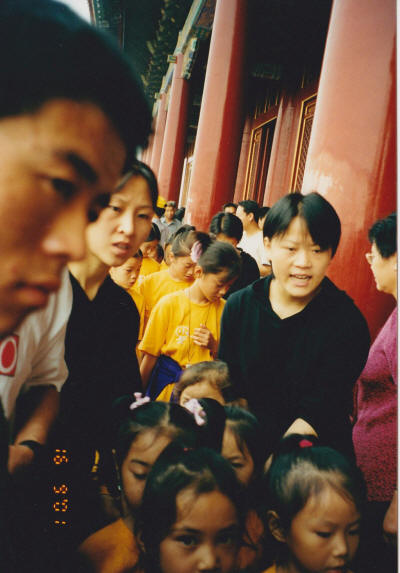 |
When I visited China for the first time in 2001, it was a business
trip to Beijing. This picture was taken on top of the Gate of
Heavenly Peace (天安门 - Tiān'ānmén). A colleague took me up there one
early morning, and soon I was stared at as a curiosity by a large group
of schoolchildren. One girl plucked up the courage to say "Welcome to
Beijing", to which I responded with my then almost nonexistent Chinese:
"我很喜欢北京 - Wǒ hěn xǐhuān Běijīng (I like Beijing very much)". Once I had
said that, all pupils queued up to shake my hand... I felt like a
celebrity. This show of friendliness and hospitality has been
among my first memories of China, and I admit that it is one of the
foundations of the image I have about it. And although I have also met
rude people and have been cheated, this kind of friendliness I have
experienced many more times since. |
| Changshu |
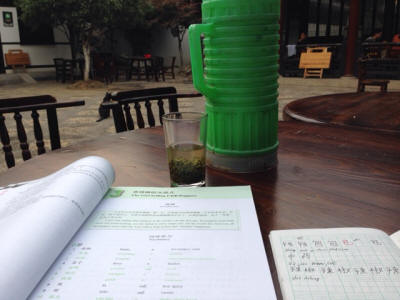 |
常熟 Chángshú means something like frequent harvest, the city is about
three thousand years old and lies in the fertile alluvial plains of the
Yangtze river.
This picture was taken in the Tea House in Fangta Park in
Changshu. During the time I
lived in China, this town was my home, so
there are separate pages about this.
During summer, I often went to
this tea house to do my homework. |
| Chengdu |
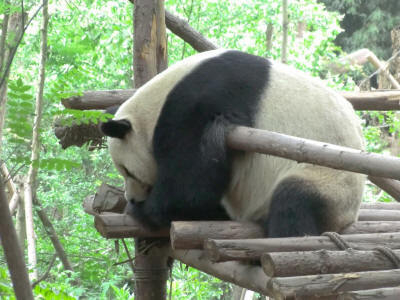 |
When I visited Sichuan province, my first stop was 成都 Chéngdū, and one
of the highlights there is the Panda breeding centre. Pandas are
genetically omnivores which for some reason changed to a vegan
lifestyle, almost entirely living off bamboo. Since bamboo contains very
little energy, Pandas (like sloths) have a very slow metabolism and are
mostly either sleeping or eating.
Pandas are cute, and that is why
they have become a symbol of China; but regarding the energy and
determination of the Chinese people, they are plainly unsuitable.
Another memory of Chengdu is the spicy food... I could have one bite and
then my mouth was on fire, so I stayed hungry that evening.
By the way, the Chinese word for Panda is 熊猫 Xióngmāo, which literally
translates to Bear Cat. |
| Chongqing |
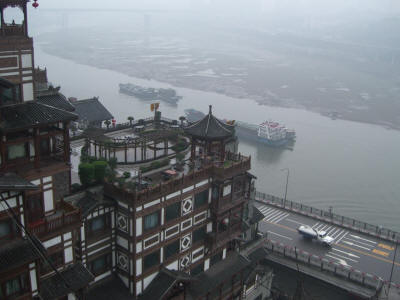 |
I cannot say much about 重庆 Chóngqìng, as I stayed there only a few
days, that was many years ago, and it was raining all time. So what I
remember apart from the rain are the spicy food, and I went to a hot
spring to warm up.
There was a small girl with her grandparents, and
the curious little girl always wanted to go into the water. Rather than
acquainting her with this element and maybe showing her how to swim, the
grandparents kept the poor little thing away. No wonder that many
Chinese can't swim.
Still, there are lots of people who can; in
Changshu I once went swimming, and I felt more like a dumpling in a soup
rather than being able to swim some lanes. |
| Dunhuang |
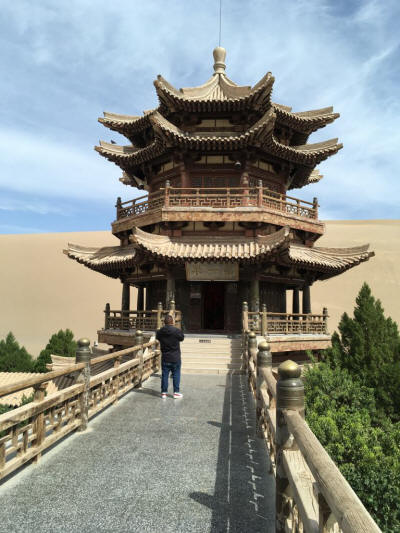 |
敦煌 Dūnhuáng is a pleasant little town in Gansu province, near the
border with Xinjiang province. It is a rather tourist place but not
overrun (at least when I was there - avoid the Golden Weeks because then
every place will be crowded).
Around Dunhuang there is desert; it is a
quite interesting sight walking down a city road and seeing the large
sand dunes behind the last houses. |
| Guangzhou |
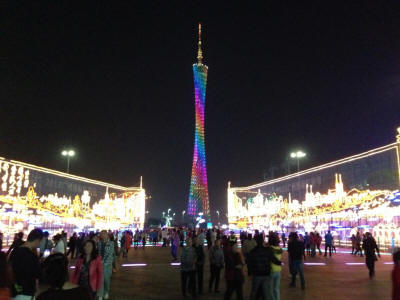 |
广州 Guǎngzhōu is not only one of the economic hubs of China, but to me
it is the city I always gained weight - Cantonese food is just so tasty.
This picture was taken on 花城广场 Huāchéng guǎngchǎng - Flower City Square, looking towards the
TV tower. You also see what Cantonese love apart from food: Colours and
a good life. |
| Hangzhou |
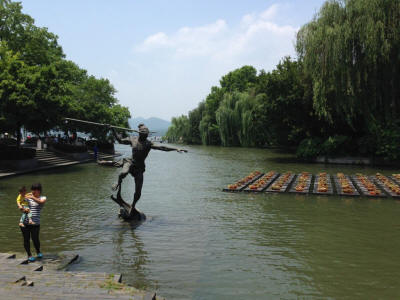 |
I have visited 杭州 Hángzhōu many times; several times I was invited to
hold lectures, at other times I came as a tourist or to visit friends.
The main attraction of course is the 西湖 Xīhú (West Lake) with its many
sights around, but also the city and the landscape around are beautiful,
in the hilly areas tea is grown almost everywhere.
In Chinese,
there is the saying 上有天堂,下有苏杭 Shàng yǒu Tiāntáng, xià yǒu Sū Háng
(above [the world] there is Heaven, [and] below [we have] Suzhou and
Hangzhou; in other words, Hangzhou along with Suzhou are considered the
earthly paradise. |
| Harbin |
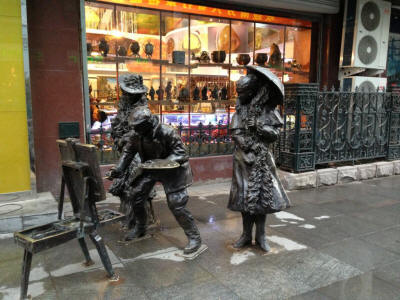
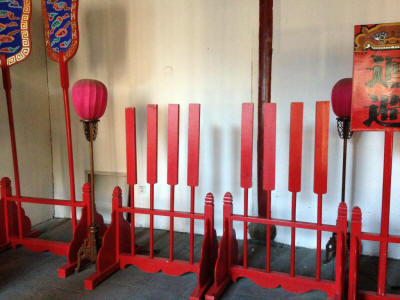 |
哈尔滨 Hā'ěrbīn (Harbin) is at about 400 km from the Russian and the North Korean
borders, so many ethnic Koreans live there. Harbin was founded in 1898 by
Russians, and this influence is still palpable today. In most of China,
when signage is bilingual, the non-Chinese signs are Latin letters; in
Harbin, you see Cyrillic very often, and when you have a European face
like mine, people will often speak to you in Russian.
There are
more surprises: Like in Russia, you can occasionally see kvass vendors
on the street, and when you see a long queue somewhere (Chinese are
usually unable to queue up, they just cannot live without crowds),
people are queuing to buy white bread from a bakery.
The lower
picture was taken in a former governor's palace, and purportedly these
paddles were used to beat up lazy government officials. I think we
should learn from China and introduce them to Germany. |
| Hong Kong |
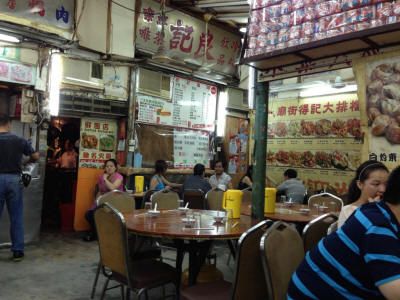 |
香港 Xiānggǎng means "fragrant harbour" (in the local dialect
Cantonese it is pronounced like Hēunggóng).
What I remember from Hong Kong are the crowds which are even denser
than in any city of the Mainland, the boat rides with the Star Ferry
between Tsim Sha Tsui and Hong Kong Island, and of course the food.
Almost regardless of how sophisticated or simple you want to eat out,
there is a large variety of places. Also, if you are new to China, HK
provides a good mix of East and West, English is widely spoken (except
by taxi drivers who often are immigrants from the Mainland), so HK may
be a sort of China for beginners. Just you shouldn't be claustrophobic,
HK ist not for hermits. |
| Huangshan |
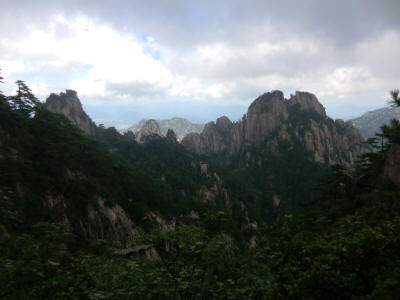 |
Huangshan (literally: the Yellow Mountains) belong to the tourist
highlights, so be sure to travel there in the off-season. If you speak
Chinese, you can organize your trip by yourself and gain some
interesting experiences - apart from difficulties finding a decent hotel
for a reasonable price, my memories include an endless bus ride back to
Shanghai. But yes, it is worth visiting. |
| Jinan |
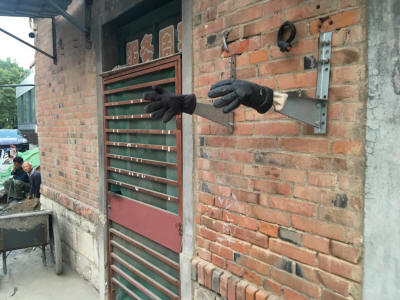 |
Workplace protection China style. The inner city of Jinan has been
made into a tourist place which nevertheless is not bad and features
some interesting small museums. Jinan is the capital of Shandong
province, which until 1914 was the German "area of interest". If you
visit the train station and think that it looks quite German, that's
why.
A better-known city in Schantung (as it was called back then) is
Qingdao, see below. |
| Jinan Qilu |
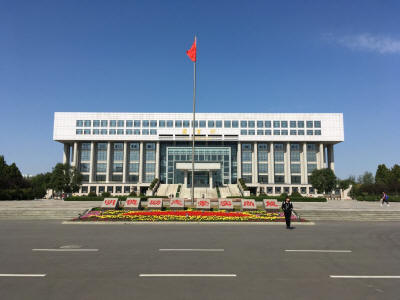 |
I visited Jinan because I was invited to hold a lecture at the Qilu
University. The university is located quite far from the city centre,
but it needs space - when I was there, the campus was just being
extended. Close to the university however there are some restaurants and
places, and at the other side there is a lake with a nice park.
In a rather dilapidated shopping centre nearby, I found a small simple
massage place run by an elderly couple. While my back was kneaded and
the guy next to me had his ears cleaned, we all had some happy chats. I
found this often in China: the best places often are those which look a
little run-down, while the glitzy ones are not always good. A reason may
be because the older next-door-type places are frequented by the locals,
and they wouldn't come if the place was bad. |
| Jinhua |
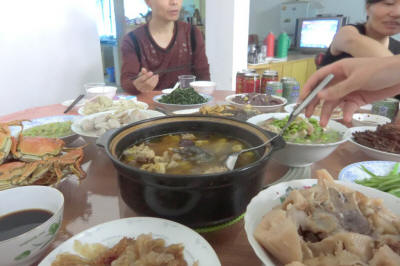 |
A friend from Hangzhou once invited me to join her visiting her
parents in Jinhua. As always in China, visiting people means lot of
food, tasty food, that is. They also took me around sightseeing, and we
lost track of the time. After a car race through the city, the doors of
the train slammed shut just as I had jumped inside. It was literally the
last second, and it was the last train to Shanghai that night - and my
flight back to Germany left next morning. One more of my adventures in
China. |
| Jiuzhaigou |
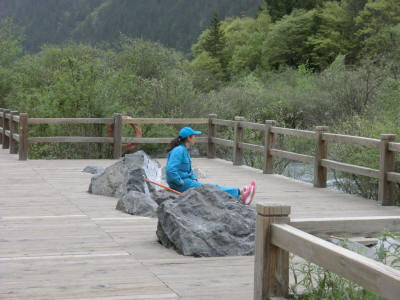
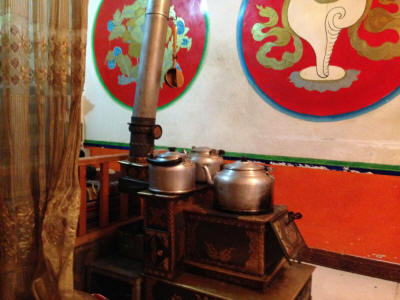 |
九寨沟 Jiǔzhàigōu, lit. "nine-village valley" - search for pictures and you will see what it is like,
and you can imagine the herds of tourists crowding that place.
Yet, as everywhere in China, you can always find peaceful places. At one
side of the valley, there is a road frequented by the buses which
transport the crowds back and forth. At the other side, there is a
wooden walkway where you can sit down, smile into the sun and relax.
Next to my hotel in 漳扎镇 Zhāngzhāzhèn, there is a small Tibetan restaurant. Jiuzhaigou is
located in Sichuan province, but culturally it already belongs to Tibet.
The food was tasty, and if you believe that all Tibetans do is to pray,
they have discovered the art of distilling, and their booze is not for
those with sensitive throats.
Other memories I have is the ten
hour bus ride from Chengdu to Jiuzhaigou with the intermediate stops at
roadside rest areas, where friendly ladies collected 1 Yuan for everyone
who wanted (or needed) to visit what only hardcore euphemists would call
a restroom. |
| Lanzhou |
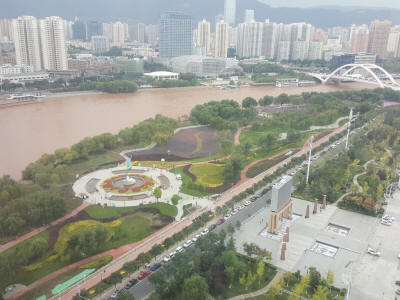 |
Of Lanzhou I cannot tell much, as I stayed there only one night
during a stopover. Unfortunately the weather was quite cold and rainy,
so apart from a short walk along the river I haven't seen much of the
city. |
| Longjing |
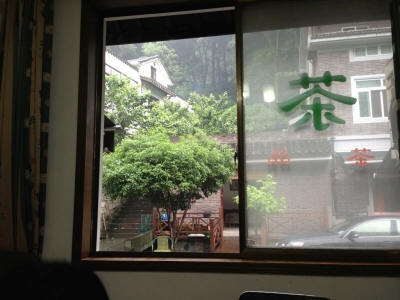 |
Longjing (literally: Dragon Spring) is a small village near
Hangzhou, and it is famous for its tea. If you have ever travelled in
Germany to the wine villages lining the Mosel and Rhine rivers, Longjing
is very similar: Every other house is a tea house where you can taste
the local produce. Of course, this is China, so you may actually get
some lower quality that grew in other places, while the high quality tea
is sold elsewhere. |
| Nanjing |
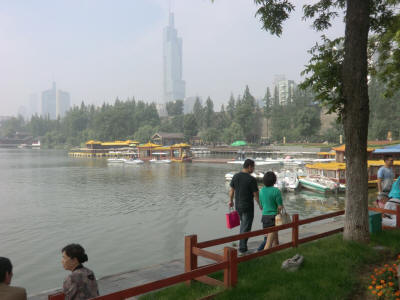 |
Places I have visited in Nanjing are the Xuanwu Lake which has some
artificial islands connected by causeways, the former seat of the
government of Sun Yat-sen, but also the memorial of the Nanjing
massacre, a place that has left a deep impression on me. |
| Qingdao |
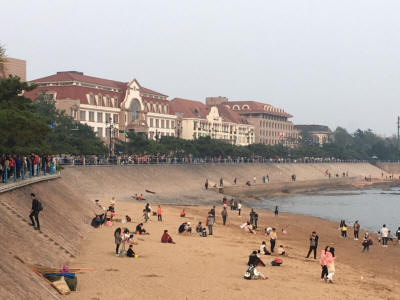 |
Until 1914, this city was called Tsingtau and it was the German Hong
Kong. Still today, the old part of the city looks very German, with a
distinct Wilhelminian architecture. There are cobblestone roads which
you might as well find in Berlin, and the scenery at the shore of the
Pacific is not very different from the spa towns lining the Baltic Sea
coast.
The German heritage is carefully preserved: When the train
station was demolished to make way for a larger one, the new station was
built in the old style, so if you are bored of the Chinese high-speed
rail stations, which despite trying to outfancy each other, somehow all
look similar, the station in Qingdao is different. |
| Tsingtau Germania-Brauerei |
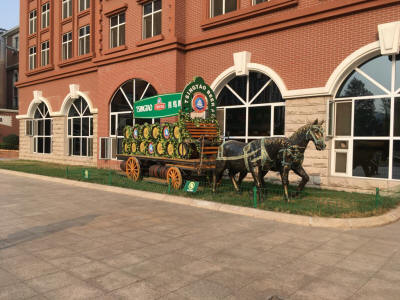 |
Where Germans are, there is beer. So in 1903, the Germania-Brauerei
was founded, which since has been renamed to Tsingtao and today is one
of the largest breweries of the world.
|
| Qinghai Lake |
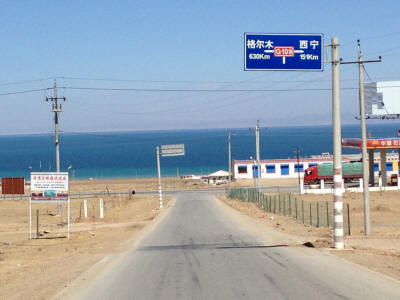 |
When one is tired of the crowds in China, Qinghai province is a
place one can visit. Qinghai lake is a salty lake, when I walked along
the shore in my usual hiking pace, I quickly found myself out of breath.
I checked my GPS and found the reason: The lake is at 3196 m above
sea level. The road sign tells us that from here Xining, the next city,
is at 151 km, while to the other side, Golmud is 630 km away. Between
this place and Xining, there were two or three small villages consisting
mostly of restaurants and lorry repair shops, and otherwise absolutely
nothing in between. |
| Shanghai |
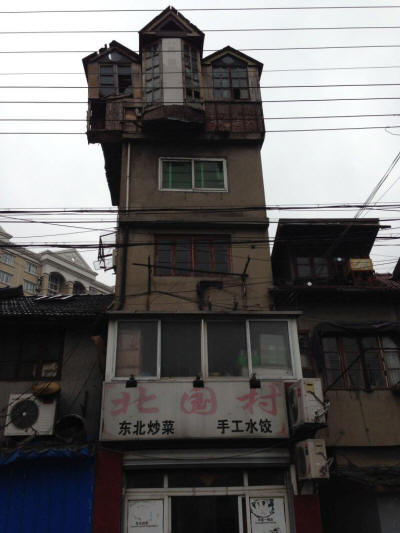
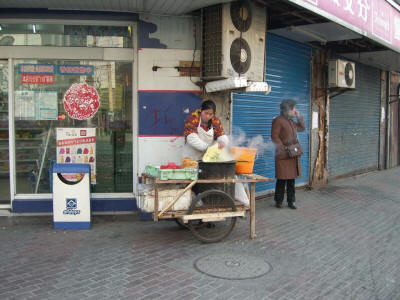 |
Shanghai is not only high-rises and glitzy modern buildings. You can
find traditional areas, small alleys and quiet places right next to the
hustle and bustle.
Even right next to the hotspots, there are
small parks, or one can have a break at one of the roadside eateries.
If one is more for crowds, riding the subway and changing lines at
People's Square during rush hour can be real fun. While on the subway,
it is even possible to sleep, because it is so full that you won't slump
or fall. |
| Suzhou |
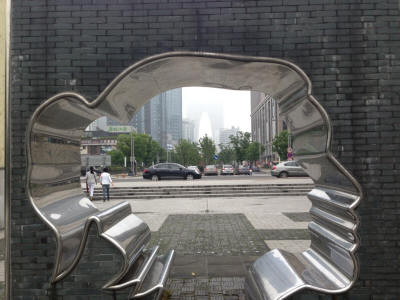 |
When I first visited Suzhou, Shanghai was more than one hour away by
those famous (or infamous) green trains. For a couple of years
now, by high-speed rail Suzhou has become more of a suburb, albeit a
populous one.
In 2004, I attended the official inauguration of a
factory the IT systems I had set up; we stood at the second floor
window, and while the flags were raised, I played the German and Chinese
anthem from my Nokia phone.
Almost ten years later, just after I
had moved to China, I was invited to a friend's wedding. |
| Tangshan |
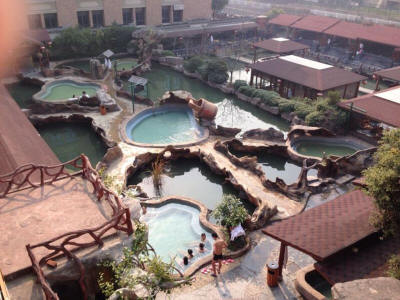 |
Tangshan is a place that is difficult to find on a map, it is just
an hour of a bumpy bus ride east of Nanjing, and it is famous for its
hot springs. A friend had recommended this one, and it was a very nice
experience. By the way, the name 汤山 Tāngshān translates
to "Soup Mointain". Don't stay in the hot pool for too long! |
| Tongli |
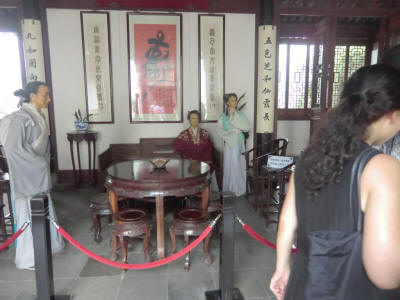 |
同里 Tónglǐ is one of the water towns close to Suzhou, it is full of
canals (with boats very closely resembling the gondolas one finds in
Venice), exhibits of old, shops, and tourists. |
| Turpan |
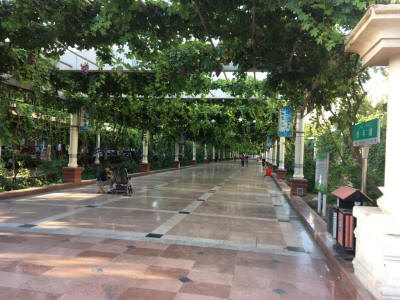 |
Turpan is an oasis in Xinjiang, some 300 km southwest of the
Mongolian border. Turpan is famous for its grapes, but there are also
some smaller and more hidden sights, like a small but interesting museum
of the irrigation system called Karez. |
| Wuxi |
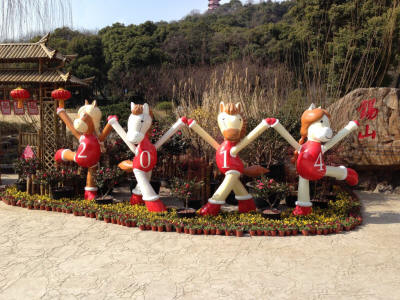
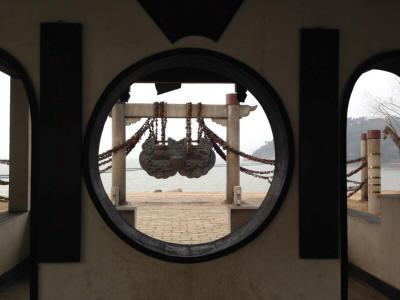 |
Wuxi 无锡 is also located at Taihu Lake, not far from Suzhou. Names of
Chinese cities can be interesting: In the old times, tin was mined here, and
the city was named "有锡-Yǒuxī" which simply means "has tin". After the
mines were depleted, the city was renamed to its current name, which
means "without tin".
The upper picture was obviously taken at the
beginning of 2014, which was the year of the horse, and the lower one is
the temple of 月老 Yuèlǎo on 仙岛 Xiān Dǎo (Fairy Island) near Wuxi.
In Chinese mythology, 月下老人 Yuè xià lǎorén (or Yuelao for short), lit.
the old man under the moon, is the god of love. In his book it is
written who will fall for whom, and then he connects the chosen ones by
tying a red ribbon to their ankles, so that they cannot run from each
other. Well, methinks that maybe he could try tying the hearts rather
than the ankles. |
| Xi'an |
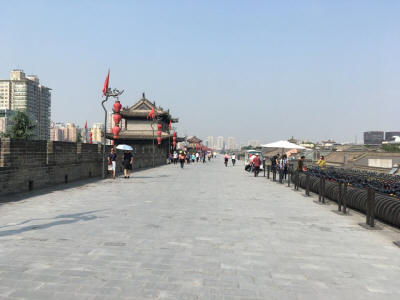 |
Xī'ān 西安, lit. Western Peace, is another ancient capital of China.
Apart from its impressive and fully intact city wall, and of course the
Terracotta Warriors, my memories includes eating 肉夹馍 Ròujiāmó. In Xi'an,
there is a sizeable 回族 Huízú (Hui) population. The Hui are ethnic Han
Chinese who are Muslims, and so the Roujiamo in Xi'an are made with beef
rather than pork. That apparently makes it so famous that people were
queuing up for after having been handed reservation cards. |
| Xining |
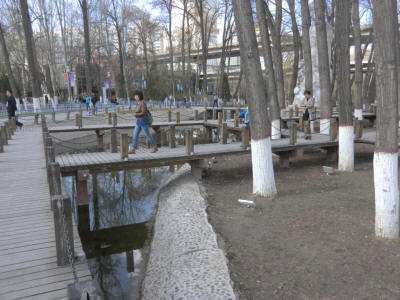 |
Xining is the capital of Qinghai province, and I stayed there in
order to visit Qinghai Lake. It is obvious that this region doesn't
receive much rain, the few fields outside the city consist of many micro
basins, and most of all I remember the grayish dusty appearance of
almost everything. Xining is a place where several cultures mix, so
apart from Chinese characters, don't be surprised to see Arab and
Tibetan script on shop labels or even road signs.
A memory is the
Uyghur restaurant where I had a tasty lunch and afterwards a long
conversation about German cars with the owners. |
| Yangshuo |
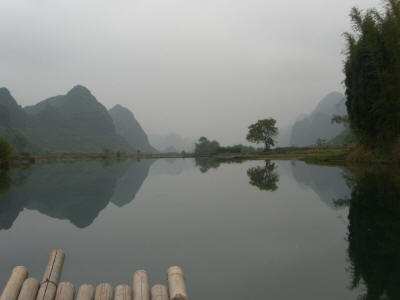 |
Yángshuò 阳朔 is located among the karst hills near Guilin. I went
there twice so far, about ten years apart. The first time, I stayed
three days with a private tour guide on a quiet river, crawled through a
muddy cave, cycled along dirt paths through small villages, and took a
bus ride together with farmers, chicken, and goods.
The second
time, it was much more touristy, but still I believe that the landscape
is worth it; Yangshuo is a highlight of China and I hope to be back one
day. And I would visit 刘三姐 Liú sānjiě a third time, so impressive is the
show in the open-air stage about the folk tale of the three Liu sisters. |
| Yangshuo - 20 RMB |
 |
One more impression of my first trip to Yangshuo is this location:
If you ever admired the landscape on the reverse of a 20 RMB bank note,
it is here. |
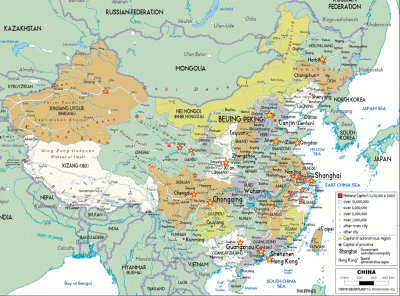


































 home
home China
index
China
index email
email working in China
working in China